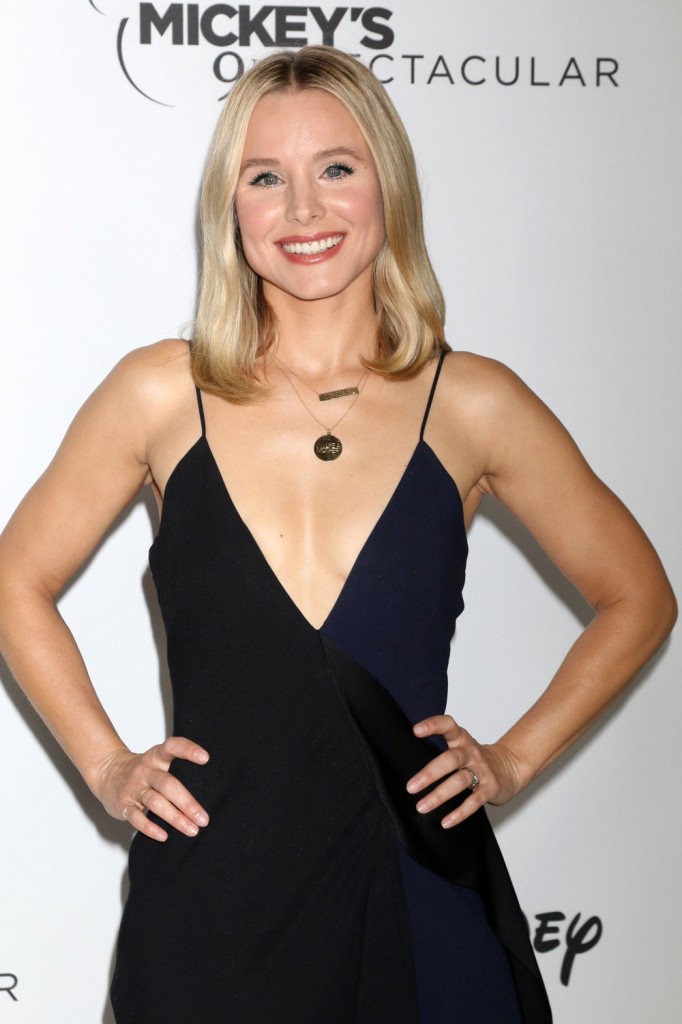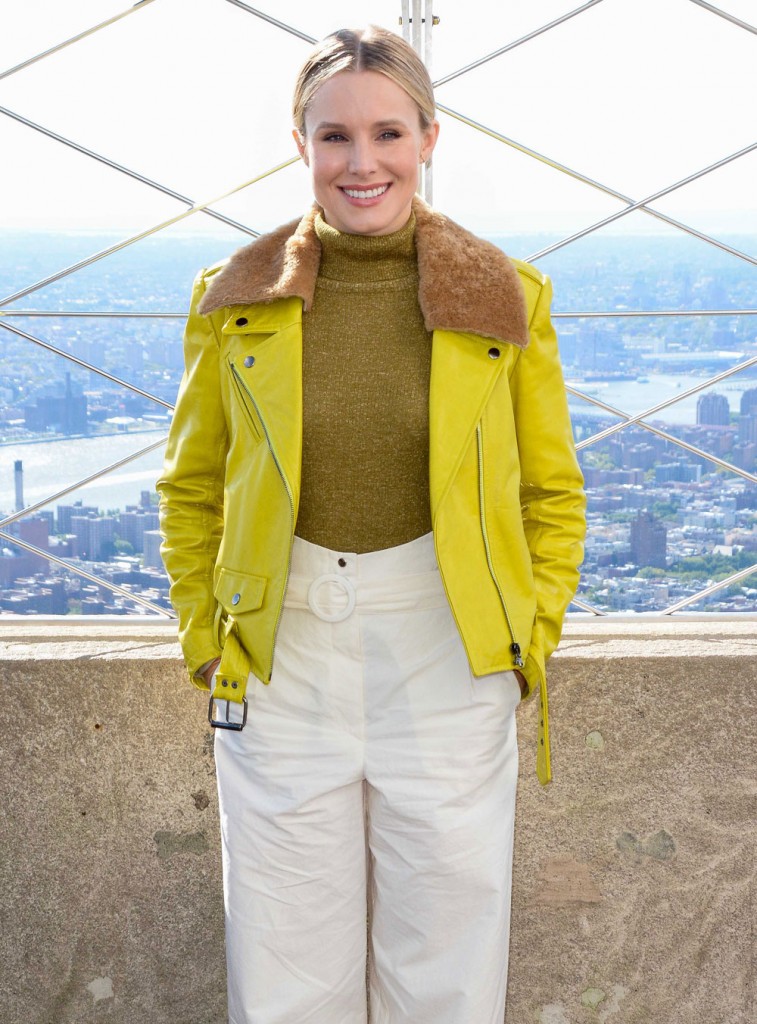
Just yesterday we discussed Keira Knightley not allowing her daughter Edie, 3, to watch classic Disney films like Cinderella or The Little Mermaid because of the message that women need saving. More modern Disney stories with heroines who have self agency, like Moana and Frozen, are ok in Keira’s house though. Frozen voice actress Kristen Bell and her husband Dax Shepard have two daughters, Lincoln, 5, and Delta, 3. Kristen recently told Parents Magazine that while she doesn’t ban those stories she does use them as talking points about consent.
On reading Snow White to her daughters
“Every time we close Snow White I look at my girls and ask, ‘Don’t you think it’s weird that Snow White didn’t ask the old witch why she needed to eat the apple? Or where she got that apple?’ I say, ‘I would never take food from a stranger, would you?’ And my kids are like, ‘No!’ And I’m like, ‘Okay, I’m doing something right.'”“Don’t you think that it’s weird that the prince kisses Snow White without her permission?” Bell says she has asked her daughters. “Because you can not kiss someone if they’re sleeping!”
On using books to teach about feelings
“There’s a book called Grumpy Monkey that we love that allows the monkey to be grumpy, even at the end. Other characters give him solutions but he decides he’s still grumpy,” Bell explains. “I’ve had that feeling, and I want my girls to know that you’re allowed to feel it. Figure out ways to pick yourself up when you are ready. I really like that message.”On teaching Lincoln to read
“I look at my child’s brain like a hungry stomach. I have to feed it every day. Even if I’m rushed, I have to feed their brain just like I feed their belly.”
Kristen spoke to Parents at an event for Baby2Baby, a Los Angeles-based charity which provides supplies to families in need. She also talked about the importance of teaching her daughters about charity, which is an issue that she often champions.
It’s smart to point out the issues in the old fairy tales, which are based on 200 year old stories. Even more recent media can be obviously problematic. My son is a teenager and I recently thought it would be a good idea to rewatch some of the classic John Hughes movies I loved when I was his age. The issues with Sixteen Candles were especially glaring and he definitely noticed them too so we talked about it. So many of the stories and movies we loved as kids look completely different when we rewatch them now. I would talk Kristen’s approach and talk about it rather than ban any of those classic stories, but that’s every parents decision. When a child is very young it might be the right approach not to let them watch it until they’re mature enough to understand.
photos credit: WENN.com and via Instagram

















I like what she says here. As we discussed yesterday, we might not be able to keep our kids from watching these stories even if we do ban them in our houses but educating them along the way and keeping the lines of communication open is key.
It gets harder when they are teens, at least with my guys, but I keep trying, hoping some stuff still sinks in!
There are so many child development studies about the benefits of “Active Viewing” with young children, especially, but there are many for older kids too. And you are absolutely right, it helps develop relationship and communication, it helps you to impart values and helps children notice the implied values inherent in media. You can create a very smart viewer when you break down commercials, for instance ( why do you think they are filming that commercial that way? do you think that toy REALLY looks as fun as the commercial?) Asking open ended questions helps in language development too. Isn’t it fascinating that there are many studies that back up the idea that children cannot seem to learn language at all from only television, but only through relationship. Sorry, I’m a therapist and child development nerd. Oh, and parents get THE PAPER BAG PRINCESS, it’s all about a princess saving a boy for a change and it’s wonderful. Both boys and girls love it, it has much humour and hilarious pictures.
I love every single thing she says here and I wish so much that I had had access to this perspective as a little girl myself. I think she’s balancing the very real fact that culture is everywhere and we can’t escape it (banning things wholesale rarely works long-term with kids) with the need to equip kids to be thoughtful and critical of the media they consume.
Yup, I do this with my boys who are 6 and 8 now. I do not let them think that the way women are viewed in these kinds of stories is in any way normal or acceptable. I also point out all the male-only shows and ask them, “Why do you think there are no women in this show?” (There’s a surprising number of male only shows) and am gratified that they often say “Because women are too smart to do the dumb stuff they do on this show” or something similar.
Yup, we do this, too. I just let my almost-5-year-old watch the live action beauty and the beast and we talked about all of the problematic stuff.
I know a lot of people detest Kristen but I generally agree with what she’s saying, even when it is delivered in an over-the-top way. At least she seems to want to use her celebrity for good.
Whenever I see a Kristen Bell post I just come to comment on how much I love The Good Place. Just started season 3 and while I think it’ll be great, I doubt it can top the epic cleverness of season 2.
Then you better keep shouting it to people because the ratings for “The Good Place” this season are in the toilet. They’ve gone down every week so far this season. Last week was a mere 0.8. That ain’t good.
Wow really? I watch it but I honestly had a feeling the show wasn’t doing well in the ratings. It doesn’t get much attention.
I can understand if the NBC ratings are bad, I watch it on Netflix though and Netflix doesn’t release ratings from what I understand.
Might be just as well. Season 2 was so good in an never ending type of purgatory. But now that they’re back on Earth it seems they could easily wrap it up.
I’m beginning to think that Kristen Bell can’t be the lead in a show. The ratings for “The Good Place” aren’t good. Her web series on Ellen has far fewer views this year than last year. It makes me wonder about the prospects for the “Veronica Mars” series on Hulu. As a (former) Marshmallow, I’m just not sure she has the “it factor” for lead roles. I’m afraid she is turning into a voice-over actress more than anything else.
I love the other 3: tahani chidi and jason. Oh and Janet!
I have just started The Good Place! I tried to give it a go when it first came out but for whatever reason it didn’t capture me. I just tried again on Netflix last night and am hooked! I’ll try to watch the new episodes so my view counts.
The whispers have started already that if NBC doesn’t pick it up for another season, Netflix will probably want it. Netflix shows it internationally, I believe.
Yea, I’m not in the States and watch it on Netflix.
That’s good to hear — I tried in once, too, and it didn’t take but I’ll try it again because I need something to watch. I tried The Haunting of Hill House and that was a mistake, way too scary. Not what I need right now.
And this is how fairy tales are meant to be consumed. They teach why it’s important to listen to your parents, don’t talk to strangers, be kind to people who are different, etc. Instead of rejecting these stories, Kristen is using them as teachable moments. Good for her!
There’s a great quote about this in the beginning of Coraline: “Fairy tales are more than true: not because they tell us that dragons exist, but because they tell us that dragons can be beaten.”
Very true! There’s actually a book by a psychologist, Bruno Bettelheim, called ~The Uses of Enchantment~ that talks about how fairy tales work with our developing psychology as kids. It’s a really interesting read!
I don’t discuss it like that exactly, though I may start now. I definitely “edit” older books and the stories my niece likes to be told in real time though. Princesses solve their own problems, Tiger Lily is a Native American, Hermione Granger doesn’t settle for the emotionally abusive guy , etc.
Even though everything she says is common sense, I’m glad she says it because perhaps some parents don’t do that? It’s hard for me to imagine NOT having those conversations, but that’s most likely naive of me. My first kiddo was born 1990 and second 1997, I started my conversations the second they were born (albeit in my world famous baby talk voice lol).
Her “wokeness” is exhausting. These are fairytales.
And they send messages that are often antiquated and in many cases misogynistic. They need to be discussed. I never wanted my girlspawn to read “The Little Mermaid” and think that it’s acceptable to give up all you have, all that makes you YOU, for a man you don’t even know.
Agree, I don’t want my daughter to internalize ideas about male/female relationships that are sexist or misogynistic, and lots of “classic” fairy tales have those elements. Girls are bombarded with messages about how they should look, act, think, feel, sound from an incredibly young age, and I think part of my job as a mother is to counteract that with positive messages about our values as a family and her worth as a person.
My question with all of this is – did her mother and did Keira’s mother not discuss the problematic nature with them when they were little? I know society is finally – beginning- to catch up with feminist issues, but I don’t think educating your children about this is some incredible woke, newfound thing.
My mother always discussed these things with us when we were growing up. She didn’t wait until 2018 to mention it. Maybe it’s because she was a single mom, I’m not sure. But the need to resolve – and the resolution – of this material is not new. No news here.
I’m not sure why my previous comment didn’t show up, but I agree with you. These parenting lessons she’s giving to us aren’t new information. It’s insulting to be told how to correctly raise children by someone so young with such young children.
Yes, I agree. There’s a lot of cultural stuff I learned about from watching old movies with my parents. Like the blackface scene from Holiday Inn… these days they edit it out when it’s on TV, but we used to watch that movie almost every year when I was little, and every single year my dad would explain the history of blackface to me and tell me why it was wrong and wasn’t acceptable in today’s culture. As a result, I was never the dumbass white kid who wore blackface to Halloween party in college or whatever. I think consuming historical culture is so important to understanding society, and I’m grateful my parents taught me so much about the world I’m living in.
Maybe their mothers didn’t. I’m Keiras age and my mother never talked to me about anything like consent or problematic/questionable stories. I was raised in a relatively conservative Catholic home and the only lesson I received was to never have premarital sex and to find a good catholic boy to marry. That’s great if your mothers were progressive and encouraged an open dialogue but thats not the reality for so many women. We have to figure out for ourselves how to parent our children and instill feminist values that were never present in our upbringings.
I grew up in the late 80s / early 90s and no, my parents didn’t discuss any of that with me at all. My mom is one of the least enlightened people I know and my dad was totally checked out of hands on parenting. I wish so much I had been exposed to these ideas as a girl. It would have saved me a lot of misery and a really terrible first marriage.
Does her contract with Disney not have a clause in it that she can’t bad-mouth Disney movies, characters, and properties? (Yes, I know Cinderella pre-dates Disney, but most people think Disney when they think of Cinderella.)
I totally get where she and Keira Knightley are coming from, but aren’t some of these lessons things that are taught anyway? Like 5-year-olds knowing not to take food from a stranger? I get that it can be a useful example, but when I saw Snow White, I’m pretty sure I already knew that taking candy from a stranger was a no-no.
Like I said yesterday, one of the most important things we can teach our kids is how to separate fact from fiction. Snow White is a character in a story, and an old story at that — one that wouldn’t be written in the same way today, if at all. It’s not real. And not all scenarios on TV or in movies are realistic. I think knowing that is what kept me from thinking anything I saw on my screen should dictate how I acted, apart from driving my brother crazy by singing I’m Wishing all the time.
I agree with everything she’s saying. Rather than ban something…..talk about the issues. Get those little brains thinking! I really loved what she said about a hungry brain like the belly! Feed the mind daily!!! It’s so important!
I’m totally surprised that Disney has not remade all of the first princess movies – Snow White, Cinderella, Sleeping Beauty, etc – for a 2018 audience. Update the animation, modernize the songs, add new songs, change the problematic stuff, make them more entertaining for today’s kids. I know they’re doing the live action/realistic remakes of everything right now, but why not do Snow White in a Frozen/Tangled style? It’s been over 80 years since the original!
They did reboot Cinderella in 2015 as live action.
Well, I was born in 95, was allowed to watch every “children’s movie” or cartoons and my parents never ever talked to me about what I just saw in a critical way, what was weird, what was wrong. I used to think people could go down Niagara Falls in a barrel until I was way older than I care to admit (woody woodpecker). So while it seems obvious, I think it’s important to talk about it still. Maybe it will help some young parents such as mine were (mom was 18, father was 23 -away working)
Most of those fairy tales are much older than 200 years and were often passed on by women. The heroines had much more agency in those original tales.
This until men wrote them down in the 19th century, removed most of that and made them into the more passive figures we know today.
It’s sad that their versions are now considered the ‘originals’ and women’s voices were erased from history, as so often.